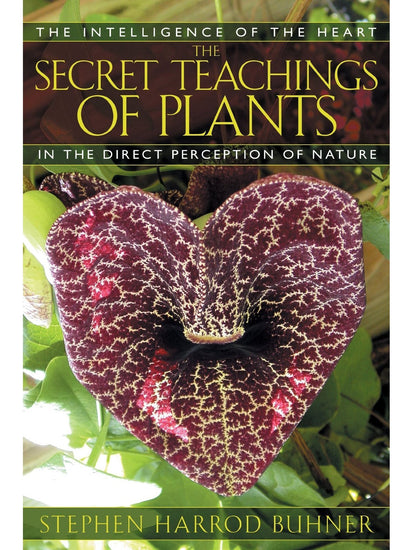Reveals the use of direct perception in understanding Nature, medicinal plants, and the healing of human disease
• Explores the techniques used by indigenous and Western peoples to learn directly from the plants themselves, including those of Henry David Thoreau, Goethe, and Masanobu Fukuoka, author of The One Straw Revolution
• Contains leading-edge information on the heart as an organ of perception
All ancient and indigenous peoples insisted their knowledge of plant medicines came from the plants themselves and not through trial-and-error experimentation. Less well known is that many Western peoples made this same assertion. There are, in fact, two modes of cognition available to all human beings--the brain-based linear and the heart-based holistic. The heart-centered mode of perception can be exceptionally accurate and detailed in its information gathering capacities if, as indigenous and ancient peoples asserted, the heart’s ability as an organ of perception is developed.
Author Stephen Harrod Buhner explores this second mode of perception in great detail through the work of numerous remarkable people, from Luther Burbank, who cultivated the majority of food plants we now take for granted, to the great German poet and scientist Goethe and his studies of the metamorphosis of plants. Buhner explores the commonalities among these individuals in their approach to learning from the plant world and outlines the specific steps involved. Readers will gain the tools necessary to gather information directly from the heart of Nature, to directly learn the medicinal uses of plants, to engage in diagnosis of disease, and to understand the soul-making process that such deep connection with the world engenders.
STEPHEN HARROD BUHNER is an Earth Poet and senior researcher for the Foundation for Gaian Studies. He lectures throughout the United States on herbal medicine, the sacredness of plants, and the intelligence of Nature. He is the author of nine works of nonfiction and one book of poetry, including the award-winning The Lost Language of Plants and Sacred Plant Medicine. He lives in Braintree, Vermont.
Jacket Description/Back:
NEW SCIENCE / ECOLOGY "Of the truly great books appearing today The Secret Teachings of Plants is easily the most rewarding I have had the privilege of reading." --Joseph Chilton Pearce, author of The Biology of Transcendence "A 'must read' for herbalists, healers, gardeners, nature lovers, and anyone who has ever been moved to tears by the everyday miracles of life." --Susun S. Weed, author of Healing Wise Mankind cannot survive without the nutritional and medicinal properties of plants.
The number of plant species on Earth has been estimated at around 400,000, with many of these species remaining unknown to humans. While only a fraction have been identified and categorized by Western botanists, it is safe to say that many of the plants unknown in the West are known to indigenous people living within the plants' natural ranges. All ancient and indigenous peoples insist their knowledge of plant medicines comes from the plants themselves and not through trial-and-error experimentation. Less well known is that these plant teachings are at the basis of many of the modern discoveries in both medicine and in plant foods. Throughout the world there is a tradition of direct perception of nature through the "intelligence of the heart."
Recent discoveries in neuroscience have proven that over 50 percent of the heart is comprised of neural cells. The heart is, in fact, a brain in its own right. Heart-centered perception can be exceptionally accurate and detailed in its information gathering capacities, as indigenous and ancient peoples assert. Stephen Harrod Buhner explores this heart-centered mode of perception in great detail.
He includes leading-edge information on the physical mechanisms of heart-based cognition and explores the work of numerous remarkable people who perceived the world with their hearts, including Henry David Thoreau; Luther Burbank, who cultivated the majority of food plants we now take for granted; George Washington Carver; Masanobu Fukuoka, author of The One Straw Revolution; and the great German poet and scientist Goethe, who studied the metamorphosis of plants. Buhner shows us how these great thinkers achieved a direct perception of nature using the cognitive abilities of the heart. He provides the knowledge and techniques necessary to develop heart-based perception, which is our birthright. He teaches us how to learn the medicinal uses of plants directly from the plants themselves and to understand the soul-making process that such deep connection with the world engenders.
 Fair and ethically
Fair and ethically traded products
- Offering authentic, sustainable products that support artisans, their families, and indigenous ways Learn More...
 Providing a connection to the sacred
Providing a connection to the sacredarts of indigenous communities
- Consciously serving our community for over 22 years with integrity and passion Learn More...
 Living in harmoney with each other
Living in harmoney with each otherand our earth
- Reducing our use of resources with Earth conscious shipping and packaging practices Learn More...
 Fair and ethically traded products. Learn More
Fair and ethically traded products. Learn More
- Offering authentic, sustainable products that support artisans, their families, and indigenous ways Learn More...
 Providing a connection to the sacred arts of indigenous communities. Learn More
Providing a connection to the sacred arts of indigenous communities. Learn More
- Consciously serving our community for over 22 years with integrity and passion Learn More...
 Living in harmoney with each other and our earth. Learn More
Living in harmoney with each other and our earth. Learn More
- Reducing our use of resources with Earth conscious shipping and packaging practices Learn More...
















